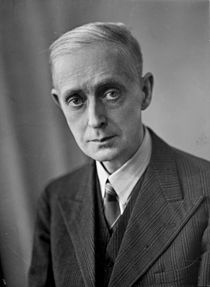Fartein Valen
| Fartein Valen | |
|---|---|
 |
|
| Born |
25 August 1887 Stavanger, Norway |
| Died | 14 December 1952 (aged 65) Haugesund, Norway |
| Nationality | Norwegian |
| Occupation | Composer |
Fartein Valen (25 August 1887 – 14 December 1952) was a Norwegian composer, notable for his work in atonal polyphonic music. He developed a polyphony similar to Bach's counterpoint, but based on motivic working and dissonance rather than harmonic progression.
Valen was born in Stavanger, Norway in 1887 into a deeply Christian religious family and maintained his religious beliefs all his life. His parents were missionaries, and he spent five years of his childhood in Madagascar (Vollsnes 2001). In addition to his aptitude for music, he was also a polyglot, mastering at least nine languages. He earned his examen artium with the highest grades in all subjects except mathematics. He loved cats, nature and literature, cultivated roses (even developed an award-winning hybrid), and after losing them in a devastating freeze took up growing cacti.
In 1906, Valen moved to Oslo to study Norwegian literature and language but also took classes with Catharinus Elling (1858–1942) at the Oslo Conservatory of Music, graduating with a degree in organ playing. In 1909 he moved to Berlin to study piano, theory, and composition at the Music Academy with (amongst others) Max Bruch (Vollsnes 2001). While in Berlin, he worked on exercises in both tonal and atonal counterpoint.
In 1916, he returned to Norway and took up residence at his family estate with his mother and sister in Sunnhordland where he started the most productive phase of his career, churning out more than 25,000 piano etudes (though they are not among his official works), while continuing to refine his own dissonant counterpoint. The counterpoint has similarities to that of J.S. Bach and Arnold Schoenberg, though evidence reveals that they were developed independently.
...
Wikipedia
